

Digital presence as an indicator of digital capital – digital academic. The 'onlooker effect': how bystanders influence our use of digital technologies. Firefox fights for family privacy - Internet Citizen. Parents have enough to sweat over without worrying about how tech is tracking their family.
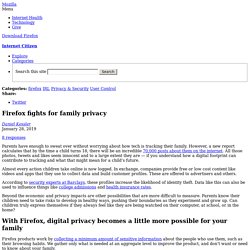
However, a new report calculates that by the time a child turns 18, there will be an incredible 70,000 posts about them on the internet. All those photos, tweets and likes seem innocent and to a large extent they are — if you understand how a digital footprint can contribute to tracking and what that might mean for a child’s future. Almost every action children take online is now logged. In exchange, companies provide free or low cost content like videos and apps that they use to collect data and build customer profiles. These are offered to advertisers and others. According to security experts at Barclays, these profiles increase the likelihood of identity theft. Beyond the economic and privacy impacts are other possibilities that are more difficult to measure. Protect your family with Firefox for desktop Protect your family on mobile devices. Toward digital praxis: just thinking out loud.
Introduction First of all this is just open thinking – I am looking for feedback.
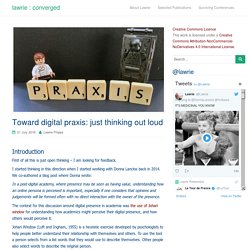
I started thinking in this direction when I started working with Donna Lanclos back in 2014. We co-authored a blog post where Donna wrote: Lastrefuge: Educational Policy: why should we care? Policy documents are said to be rational drivers of accountable, publicly funded processes.
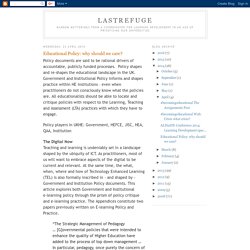
Policy shapes and re-shapes the educational landscape in the . Government and Institutional Policy informs and shapes practice within HE institutions – even when practitioners do not consciously know what the policies are. What does it mean to have a professional identity in an age of social media? Notes for an upcoming talk: not yet proof read!
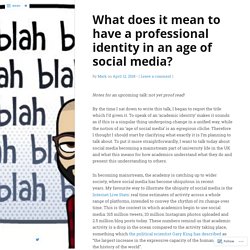
Rules of engagement: seven lessons from communicating above and below the line. DCRL Questions. Tweetchat help. Every answer serves as a starting point, not an end point.
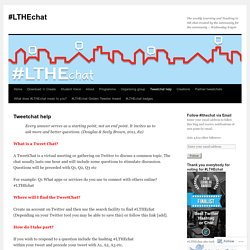
It invites us to ask more and better questions. (Douglas & Seely Brown, 2011, 82) What is a Tweet Chat? A TweetChat is a virtual meeting or gathering on Twitter to discuss a common topic. The chat usually lasts one hour and will include some questions to stimulate discussion. This is what .com looks like in different languages - Dec. 10, 2015. This week, Verisign, the registry for domains ending in .com and .net, launched the first internationalized version of .com.
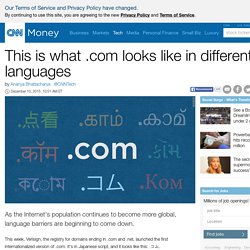
It's in Japanese script, and it looks like this: .コム. Previously, the only way to load a .com website was to type the Latin characters that are common to English, French, Spanish and German speakers but unfamiliar to billions of people around the globe. Approximately 45% of all websites in the world are in a language other than English, according to W3Tech.
Building social engagement at your college or university. Last week we opened our call to find 50 of the most influential HE professionals on social media in the UK.
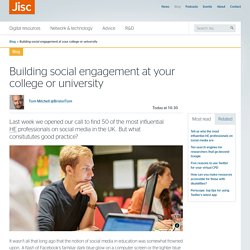
But what consitututes good practice? It wasn’t all that long ago that the notion of social media in education was somewhat frowned upon. A flash of Facebook’s familiar dark blue glow on a computer screen or the lighter blue of Twitter would immediately let off warning signs that attention wasn’t on the job at hand – far be it that these channels could actually be useful in the professional environment.
Thankfully, most colleges and universities today recognise the huge potential of social media for sharing key messages, outputs and directing people to your content. The invention of tradition: how ‘researchers’ replaced teachers. The word “traditional” is possibly the most overused term in higher education.
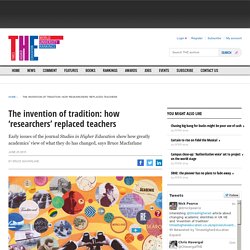
Jaime Casap Explains Why Global Competence Matters: It's Not Really a Small World - Global Learning. Jaime Casap, Chief Education Evangelist at Google, Inc. shares why global competence is critical for students.
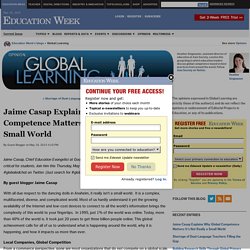
Join him this Thursday, May 21st at 8pm ET/5pm PT for a special #globaledchat on Twitter. (Just search for #globaledchat to join the conversation). How to Curate Your Digital Identity as an Academic - Advice. By Kelli Marshall In 2009, anyone who searched my name on the web would first encounter the opinions of a disgruntled Midwestern undergraduate who lambasted me for being an unfair, unprofessional, and essentially ignorant professor.
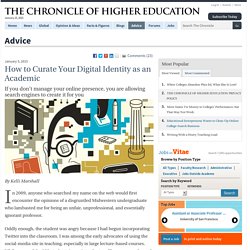
Oddly enough, the student was angry because I had begun incorporating Twitter into the classroom. A hard act to Swallow. About Me Steve Wheeler I'm Associate Professor of learning technology in the Plymouth Institute of Education at Plymouth University. I chair the Professional Enhanced Learning Conference (Pelecon), and I serve on the editorial boards of a dozen international journals, including the open access publications Research in Learning Technology (formerly ALT-J), Digital Culture and Education, EURODL and IRRODL.
Turn the Pressures of Technology into Potential - John Hagel III. Digital technology is full of paradox, yet we often tend to under-emphasize or even ignore the paradoxes — often looking at either technology’s problems or its promises, rarely examining both at the same time. Social Media in Education. What Teachers Need to Know about The New Creative Commons 4.0 Licenses. A blog by chris james carter. Forms of IPR. Use a 3rd Party Service to Post to Various Sites. What’s New in 4.0. Creative Commons worked for more than two years to develop the next generation of CC licenses — the version 4.0 CC license suite. How Twitter chats support being a Connected Educator. Start. University of Plymouth.